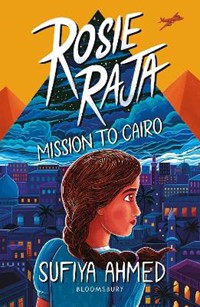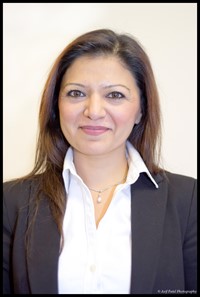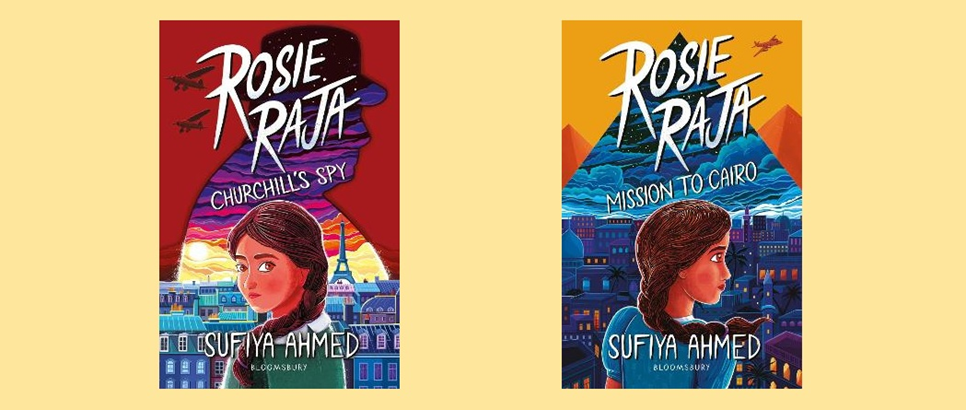Sufiya Ahmed


About Author
Sufiya Ahmed worked in advertising and in the House of Commons before becoming a full-time author. In 2010 she set up the BIBI Foundation, which arranges visits to the Houses of Parliament for children from underprivileged backgrounds. Sufiya has written several children's books including My Story: Noor-Un-Nissa Inayat Khan, Secrets of the Henna Girl and Under the Great Plum Tree which was longlisted for the UK Literacy Association Book Awards, and Rosie Raja: Churchill's Spy. Image: Asif Patel Photography
Interview
Rosie Raja: Mission to Cairo (Bloomsbury Education)
August 2023
Rosie Raja: Mission to Cairo is an adventure-packed historical fiction novel about a girl who finds herself working as a spy in wartime Cairo. Being half English and half Indian gives Rosie a unique aspect on the war - and could help her uncover who is betraying the allies.
Author Sufiya Ahmed tells ReadingZone about her adventure-packed historical fiction stories featuring the girl spy Rosie Raja, including the latest title Rosie Raja: Mission to Cairo. Find out what inspired these stories; why Sufiya gives Rosie Raja dual heritage; and why Rosie's latest mission is set in Egypt!
Review: Another thrill-seeking spy adventure.... This story is filled with adventure, culture and history.

Read a Chapter from Rosie Raja: Churchill's Spy Read a Chapter from Rosie Raja: Mission to Cairo
"I guess I'm writing stories about our shared history.
I want young people to know about our shared history and have a better understanding of the contribution of South Asians to Britain. There is four hundred years of history between Britain and India." Sufiya Ahmed
Q&A with Sufiya Ahmed
1. Hello Sufiya, can you tell us what kinds of books do you enjoy writing? What draws you to writing historical fiction?
Hello! It's lovely to be back with ReadingZone. Thanks for having me.
I like to write about brave girls who lead from the front, and I guess I'm really interested in our place in the past. I loved history at school but I never learned about the British Empire and its relationship to the land of my heritage, India. As a Brit I have always felt that I belonged, but as a little girl there were times when I felt that I was peeping into someone else's history. All the pivotal moments like WWI, WWII and the suffragettes, for example, seemed to be fought for by people who did not look like me. And that is so far from the truth.
During WWI, 1.3 million Indian soldiers came from India to fight for King and country. During WII 2.5 million soldiers came from India to fight for Winston Churchill against Hitler and the Nazis. A leading figure in the suffragette movement was Queen Victoria's god-daughter Princess Sophia Duleep Singh. Yet all these people are not mentioned in our history books, or at least they weren't when I was at school.
"I guess I'm writing stories about our shared history. I want young people to know about our shared history and have a better understanding of the contribution of South Asians to Britain. There is four hundred years of history between Britain and India."
2. Can you tell us about your Rosie Raja books?
I was inspired to write about the WWII spy Rosina Raja by the real life WWII heroine Noor-Un-Nissa Inayat Khan. Noor was one of Prime Minister Winston Churchill's spies that was sent as a radio operator to occupied France to spy on the Nazis. I thought children would enjoy this thrilling, and sometimes dangerous world through the eyes of the 11-year-old Rosie.
In the first book, it's July 1941. Rosina Raja is half-Indian and half-English. She has always lived in India, so when her mother passes away and she moves to England (where it rains all the time) she is miserable and doesn't have any friends. Life changes dramatically for Rosie when she discovers that her army captain father is actually a spy for the British government. She can't bear to be left behind so she stows away in his plane. Finding herself in occupied France, Rosie is soon drawn into the struggle against the Nazis. With new allies and new enemies at every turn, she must help her father complete his mission, and more importantly… make sure they both get home alive.'
In the second book, Rosie and her father are sent to Cairo by Sir Winston Churchill. His cover story is that he is an Egyptologist sent to protect the ancient treasures in the main Egyptian museum, mainly the Pharoah Tutankhamun. Their true mission is really to discover the identity of a double agent. A British spy who is pretending to be on our side, but is really selling our secrets to the Nazis. These are the worst types of traitors.
3. What drew you back to writing more about your young spy, Rosie Raja? Why did you decide to give her dual heritage, English and Indian?
Well, Rosie's first successful mission was in France in 1941. There are still four more years of war to get through. Churchill's spies were sent all over the world to sabotage the enemy and there are so many new adventures that she can go on. I thought young readers might enjoy another mission and Cairo is always an exciting location in children's stories.
As a child of dual heritage, Rosie has a foot in two worlds. Both her English father's world and her Indian mother's. At the time of the war, India was still ruled by the British Empire and I wanted to show Rosie trying to balance both her identities. To be part ruler, and part ruled, even though she is a princess in her mother's land.
4. Given that the books are set during WWII, why did you decide to set Rosie's new adventure in Egypt?
I think Europe has had a lot of coverage in WWII stories. The other places in the world where our soldiers fought the Nazis aren't mentioned as much, but Egypt was always very important to the British Empire. The Suez Canal is based there, a waterway through which Britain's resources sailed through. It needed to be protected from the Nazis. They wanted to take it as it would weaken Britain in the war and the two sides fought battles in North Africa because of it. This Egypt setting shows another side to WWII, and of course the more rounded and inclusive our knowledge of history, the better.
5. Are there any stand-out moments in this story for you?
The adventure side is always fun to write, but I had a lot of fun writing about Pharaoh Tutankhamun's curse which hovers in the story. What do I mean? Well, you'll have to read it.
6. How much research have you had to do for these books, and where did you go to find out about it? Have you visited modern-day Cairo?
I have visited modern-day Cairo and I spent a long time in the Egyptian museum where much of the action in the book is based. I found it a fascinating place and I made notes because I knew that I wanted to write about it in a story. At the time, I didn't know that it would be a WWII spy adventure. My notes came in very handy when it was time to plot the story.
Of course I had to read up on Egypt's role in WWII too. The battles that were fought in North Africa and the historical real life figures that played a part in defeating the Nazis there. I read big non-fiction war books and then tried to imagine the setting for Rosie's story. Much of the book is based in the glamourous hotels along the Nile River and the Egyptian museum.
7. Do real historical figures appear in these stories?
They do. Winston Churchill, of course. Vera Atkins, the real life agent who worked for the spy agency and directed many of the spies on their missions. Christine Granville is another - a brave woman who came to be known as Churchill's favourite spy. We also have a real life Nazi, General Erwin Rommel, whose war tactics were feared at the time and who led the German army in North Africa.
8. Do you have further adventures planned for Rosie?
I do. Mission to Cairo ends at the end of 1941. A lot happens in the war during 1942 and I think Rosie can play a part there somewhere.
9. If you could travel back to any period in history, and find out what really happened, where and when would you go and what would you want to learn about?
Oh goodness. There are so many periods and places. You know I would change my mind about these every day, but today let's say I'm curious about what really happened to the two princes in the tower, the sons of King Edward V in the 1490s. Did their uncle, King Richard III, really have them murdered? And if not, what happened to them? I like history to have answers.
10. What are your favourite ways to relax when you're not at your desk?
Reading has always been a favourite hobby. I like movies too and eating out with friends. And I can spend hours in museums. That's one of the things I love about living in London. The museums.
Thank you for joining us @ReadingZone!
 Rosie Raja: Mission to Cairo
Rosie Raja: Mission to Cairo
 Rosie Raja: Churchill's Spy
Rosie Raja: Churchill's Spy
 Princess Sophia Duleep Singh
Princess Sophia Duleep Singh
 Noor Inayat Khan
Noor Inayat Khan
 Secrets of the Henna Girl
Secrets of the Henna Girl
